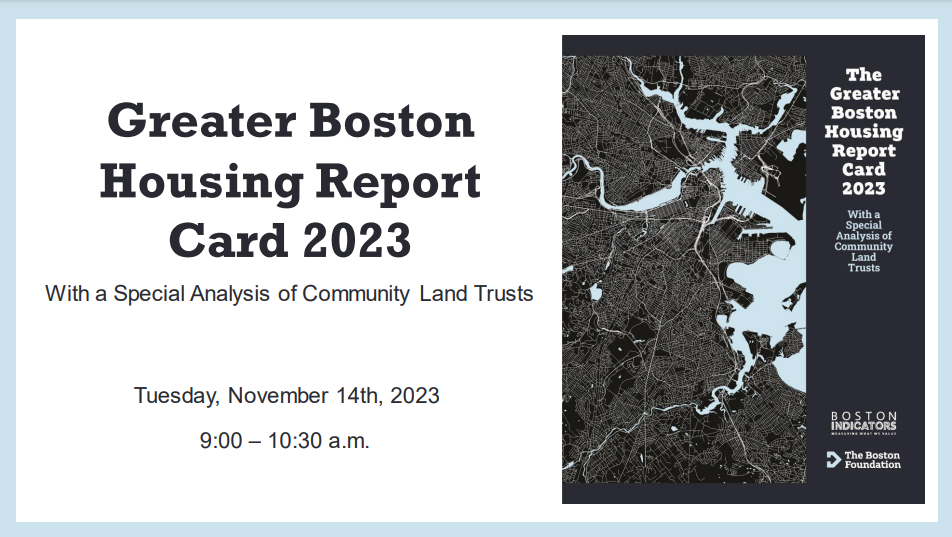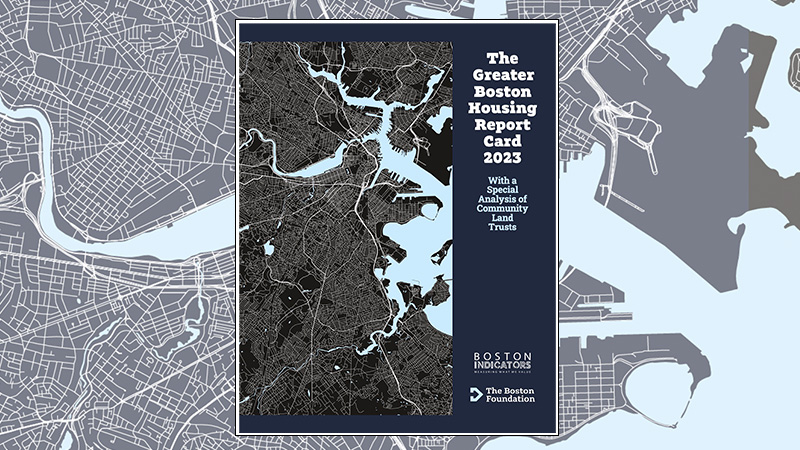Greater Boston Housing Report Card 2023
With a Special Analysis of Community Land Trusts
November 14, 2023
“To address the crisis head-on, it is essential that we understand the data and act on what it tells us.”
TBF President and CEO M. Lee Pelton opened the 2023 Greater Boston Housing Report Card forum on November 14 with this call to action to the approximately 300 attendees in the room and on Zoom.
Boston Indicators Executive Director Luc Schuster took the baton and, followed by Racial Wealth Gap Research Fellow Aja Kennedy, presented some top-level findings from the report’s “core metrics” pertinent to our region’s housing: population, supply, demand, prices, and instability. In short, though our population has been declining slightly, the supply of housing stock cannot keep up with demand, especially at the middle and lower end of the price scale; costs are high and generally, just more than half of renters are cost-burdened, paying more than 30 percent of their income on housing, with a greater share of Black and Latino renters so burdened. Cost burdens among homeowners show similar racial trends, albeit at lower levels. All of this adds up to greater instability, demonstrated by increased overcrowding and growing numbers of unhoused families. The past year’s surge in refugee and asylum-seeking migrants to Boston has added to those numbers and pushed the state’s shelter system to its limit.
Kennedy also summarized a section new to the Housing Report Card this year (its 22nd edition), which assessed local policies—recently enacted, in the pipeline, or on the horizon—as well as effective policies implemented in other states.
Community land trusts (CLTs) were the special topic of the 2023 Report Card and Penn Loh, Tufts University Distinguished Senior Lecturer, Urban & Environmental Policy & Planning presented that research, which he had headed up. Noting that our “housing crisis is a chronic problem based on historical inequities,” his findings suggest that—while not without challenges—the CLT model shows promise to improve our current situation and repair past harms. By removing land from the speculative market and putting it under control of a democratically governed community organization, the land is treated as a commons, not a commodity. Individuals can own and accrue wealth through a home, farm, or business on the land without owning the land itself. In this hybrid form of ownership, the lease of the land to users can stipulate permanent affordability. CLTs have been around for 50+ years, and Massachusetts has the largest density of CLTs across country. Scaling is a key challenge, and supporters admit CLTs won’t single-handedly resolve our housing problems, but they can be an effective tool for community control of development, yielding stability and preventing displacement.
After the data presentations, TBF Associate Vice President of Programs Soni Gupta moderated a discussion panel of community organizers and housing advocates. They covered recently passed MBTA Communities zoning laws, the relationship of community development corporations to CLTs, how to counter drivers of displacement, and more.
Jesse Kanson-Benanav of Abundant Housing Massachusetts sees hope in the new MBTA Communities legislation, calling it one of the most comprehensive zoning reforms since Chapter 40B. “It has the potential to bring zoning that will allow more moderately priced and multifamily housing [to communities that have long been off-limits to all but the wealthiest].” Acknowledging that some of those rapid transit communities are pushing back on the requirement, he said, “There’s a lesson from communities pushing back: The state needs to do more to say, ‘We own the power of zoning; we have given you the reins for generations.’… The state has to do more to take back exclusionary zoning policies from municipalities.”
Lydia Lowe from the Chinatown Community Land Trust agreed that “we need production and regulation. Production alone hasn’t made a dent,” she said, adding, “Preservation is important. Not necessarily historic preservation but of communities and affordability. Tenant opportunity to purchase could be part of that. ‘Remain, reclaim, rebuild our communities.’ That’s our motto. Homes that are most affordable are the ones we’re already in.”
City Life/Vida Urbana’s Mike Leyba left listeners with an apt analogy of our recent housing landscape when observed that “we’ve gotten good at identifying interventions at a macro scale—like an eviction moratorium during a pandemic—to prevent an ‘explosion’” that would shatter the market and people in it. But we have not been as good at preventing “implosions,” like mounting rent increases that may not be noticed household by household. “We need to get better at preventing individual implosions. When the market needs a big intervention, we work at that, but we need smaller scale solutions as well.”


Event Agenda
Welcome
Lee Pelton, President & CEO, the Boston Foundation
Presentation of the Report
Luc Schuster, Executive Director, Boston Indicators
Aja Kennedy, Racial Wealth Gap Research Fellow, Boston Indicators
Penn Loh, Distinguished Senior Lecturer, Urban & Environmental Policy & Planning, Tufts University
Panel and Q&A
Soni Gupta, Associate Vice President, Programs, The Boston Foundation (Moderator)
Mike Leyba, Co-Executive Director, City Life/Vida Urbana
Lydia Lowe, Director, Chinatown Community Land Trust
Jesse Kanson-Benanav, Executive Director, Abundant Housing Massachusetts
